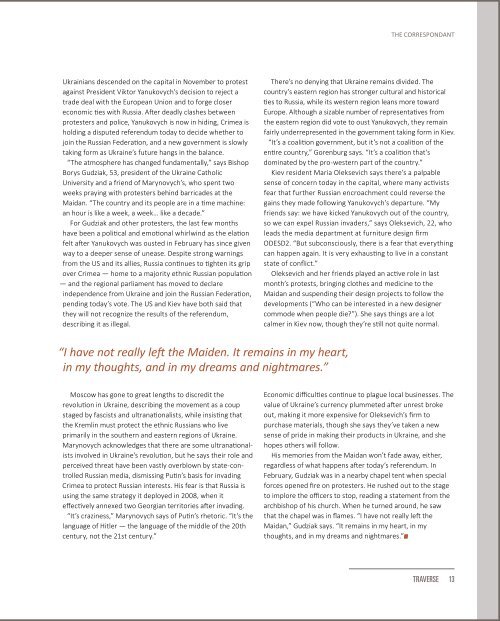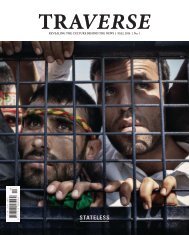TRAVERSE
Issue 1 | STATELESS A student project made at Seattle Central Creative Academy. Not created for profit.
Issue 1 | STATELESS
A student project made at Seattle Central Creative Academy.
Not created for profit.
You also want an ePaper? Increase the reach of your titles
YUMPU automatically turns print PDFs into web optimized ePapers that Google loves.
THE CORRESPONDANT<br />
Ukrainians descended on the capital in November to protest<br />
against President Viktor Yanukovych’s decision to reject a<br />
trade deal with the European Union and to forge closer<br />
economic ties with Russia. After deadly clashes between<br />
protesters and police, Yanukovych is now in hiding, Crimea is<br />
holding a disputed referendum today to decide whether to<br />
join the Russian Federation, and a new government is slowly<br />
taking form as Ukraine’s future hangs in the balance.<br />
“The atmosphere has changed fundamentally,” says Bishop<br />
Borys Gudziak, 53, president of the Ukraine Catholic<br />
University and a friend of Marynovych’s, who spent two<br />
weeks praying with protesters behind barricades at the<br />
Maidan. “The country and its people are in a time machine:<br />
an hour is like a week, a week... like a decade.”<br />
For Gudziak and other protesters, the last few months<br />
have been a political and emotional whirlwind as the elation<br />
felt after Yanukovych was ousted in February has since given<br />
way to a deeper sense of unease. Despite strong warnings<br />
from the US and its allies, Russia continues to tighten its grip<br />
over Crimea — home to a majority ethnic Russian population<br />
— and the regional parliament has moved to declare<br />
independence from Ukraine and join the Russian Federation,<br />
pending today’s vote. The US and Kiev have both said that<br />
they will not recognize the results of the referendum,<br />
describing it as illegal.<br />
There’s no denying that Ukraine remains divided. The<br />
country’s eastern region has stronger cultural and historical<br />
ties to Russia, while its western region leans more toward<br />
Europe. Although a sizable number of representatives from<br />
the eastern region did vote to oust Yanukovych, they remain<br />
fairly underrepresented in the government taking form in Kiev.<br />
“It’s a coalition government, but it’s not a coalition of the<br />
entire country,” Gorenburg says. “It’s a coalition that’s<br />
dominated by the pro-western part of the country.”<br />
Kiev resident Maria Oleksevich says there’s a palpable<br />
sense of concern today in the capital, where many activists<br />
fear that further Russian encroachment could reverse the<br />
gains they made following Yanukovych’s departure. “My<br />
friends say: we have kicked Yanukovych out of the country,<br />
so we can expel Russian invaders,” says Oleksevich, 22, who<br />
leads the media department at furniture design firm<br />
ODESD2. “But subconsciously, there is a fear that everything<br />
can happen again. It is very exhausting to live in a constant<br />
state of conflict.”<br />
Oleksevich and her friends played an active role in last<br />
month’s protests, bringing clothes and medicine to the<br />
Maidan and suspending their design projects to follow the<br />
developments (“Who can be interested in a new designer<br />
commode when people die?”). She says things are a lot<br />
calmer in Kiev now, though they’re still not quite normal.<br />
“I have not really left the Maiden. It remains in my heart,<br />
in my thoughts, and in my dreams and nightmares.”<br />
Moscow has gone to great lengths to discredit the<br />
revolution in Ukraine, describing the movement as a coup<br />
staged by fascists and ultranationalists, while insisting that<br />
the Kremlin must protect the ethnic Russians who live<br />
primarily in the southern and eastern regions of Ukraine.<br />
Marynovych acknowledges that there are some ultranationalists<br />
involved in Ukraine’s revolution, but he says their role and<br />
perceived threat have been vastly overblown by state-controlled<br />
Russian media, dismissing Putin’s basis for invading<br />
Crimea to protect Russian interests. His fear is that Russia is<br />
using the same strategy it deployed in 2008, when it<br />
effectively annexed two Georgian territories after invading.<br />
“It’s craziness,” Marynovych says of Putin’s rhetoric. “It’s the<br />
language of Hitler — the language of the middle of the 20th<br />
century, not the 21st century.”<br />
Economic difficulties continue to plague local businesses. The<br />
value of Ukraine’s currency plummeted after unrest broke<br />
out, making it more expensive for Oleksevich’s firm to<br />
purchase materials, though she says they’ve taken a new<br />
sense of pride in making their products in Ukraine, and she<br />
hopes others will follow.<br />
His memories from the Maidan won’t fade away, either,<br />
regardless of what happens after today’s referendum. In<br />
February, Gudziak was in a nearby chapel tent when special<br />
forces opened fire on protesters. He rushed out to the stage<br />
to implore the officers to stop, reading a statement from the<br />
archbishop of his church. When he turned around, he saw<br />
that the chapel was in flames. “I have not really left the<br />
Maidan,” Gudziak says. “It remains in my heart, in my<br />
thoughts, and in my dreams and nightmares.”<br />
<strong>TRAVERSE</strong> 13



